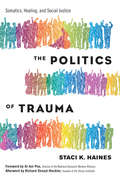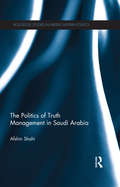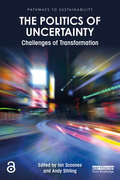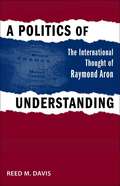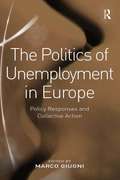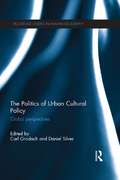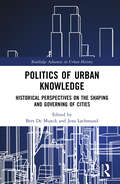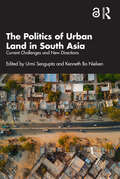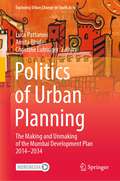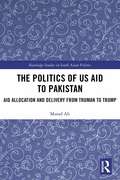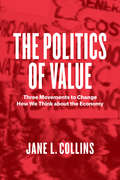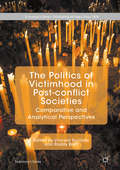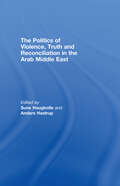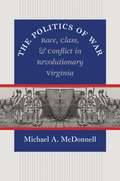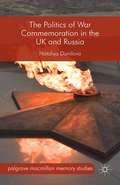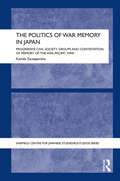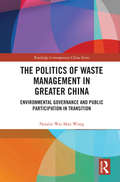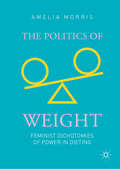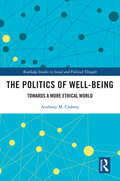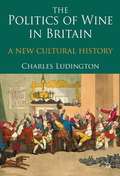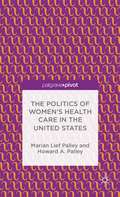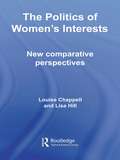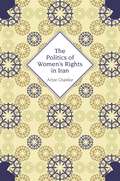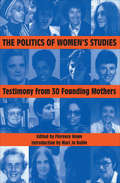- Table View
- List View
The Politics of Trauma: Somatics, Healing, and Social Justice
by Staci HainesAn essential tool for healers, therapists, activists, and survivors of trauma who are interested in a justice-centered approach to somatic transformationThe Politics of Trauma offers somatics with a social analysis. This book is for therapists and social activists who understand that trauma healing is not just for individuals--and that social change is not just for movement builders. Just as health practitioners need to consider the societal factors underlying trauma, so too must activists understand the physical and mental impacts of trauma on their own lives and the lives of the communities with whom they organize. Trauma healing and social change are, at their best, interdependent. Somatics has proven to be particularly effective in addressing trauma, but in practice it typically focuses solely on the individual, failing to integrate the social conditions that create trauma in the first place. Staci K. Haines, somatic innovator and cofounder of generative somatics, invites readers to look beyond individual experiences of body and mind to examine the social, political, and economic roots of trauma--including racism, environmental degradation, sexism, and poverty. Haines helps readers identify, understand, and address these sources of trauma to help us bridge individual healing with social transformation.
The Politics of Truth Management in Saudi Arabia (Routledge Studies in Middle Eastern Politics)
by Afshin ShahiExploring the management of ‘truth’ in the Kingdom of Saudi Arabia, this book aims to investigate the ways in which the official ‘truth’ is constructed and institutionalised in the country. The Politics of Truth Management in Saudi Arabia argues that there are two interrelated notions which articulate the ways in which ‘truth’ is conceptualised in Islam. One, at macro level, constitutes the trans-historical foundational principles of the religion, a set of engrained beliefs, which establish the ‘finality’, and ‘oneness’ of Islam in relation to other competing narratives. The other, at a micro level, takes place internally to find ‘truth’ within the ‘truth’. Unlike Islamic truth at the macro level, which is entrenched, the Islamic truth at the micro level refers to the various attempts by different agencies to claim to have found the ‘truth’ within the ‘truth’. Wahhabism, which is the product of an eighteenth century revivalist movement, is portrayed as the most ‘authentic’ reading of Islam. It is seen as the raison d'être for the prevailing political mechanism in the country and is introduced as an example of truth management at the micro level. Arguing that truth is not born in a power vacuum and often its construction and institutionalisation signify domination in one way or another, this book will be of interest to students of Religion, Politics, and Saudi Politics more specifically.
The Politics of Uncertainty: Challenges of Transformation (Pathways to Sustainability)
by Ian ScoonesWhy is uncertainty so important to politics today? To explore the underlying reasons, issues and challenges, this book’s chapters address finance and banking, insurance, technology regulation and critical infrastructures, as well as climate change, infectious disease responses, natural disasters, migration, crime and security and spirituality and religion. The book argues that uncertainties must be understood as complex constructions of knowledge, materiality, experience, embodiment and practice. Examining in particular how uncertainties are experienced in contexts of marginalisation and precarity, this book shows how sustainability and development are not just technical issues, but depend deeply on political values and choices. What burgeoning uncertainties require lies less in escalating efforts at control, but more in a new – more collective, mutualistic and convivial – politics of responsibility and care. If hopes of much-needed progressive transformation are to be realised, then currently blinkered understandings of uncertainty need to be met with renewed democratic struggle. Written in an accessible style and illustrated by multiple case studies from across the world, this book will appeal to a wide cross-disciplinary audience in fields ranging from economics to law to science studies to sociology to anthropology and geography, as well as professionals working in risk management, disaster risk reduction, emergencies and wider public policy fields.
A Politics of Understanding: The International Thought of Raymond Aron (Political Traditions in Foreign Policy Series)
by Reed M. DavisFrequently hailed as one of the greatest defenders of democratic liberalism in postwar Europe, French philosopher, sociologist, and political commentator Raymond Aron (1905--1983) left behind a staggering amount of published work on a remarkably wide range of topics both scholarly and popular. In A Politics of Understanding, Reed M. Davis assesses the originality and consistency of Aron's body of work, drawing a connection between Aron's philosophy of history and three of his abiding interests: the nature of industrial society, international relations theory, and strategic theory.Davis begins with a brief biography of Aron, known for his skepticism toward political ideologies in the post--World War II era and as an intellectual opponent of Jean-Paul Sartre. After spending three years in Germany in the early 1930s, Aron, a Jew, returned to France in 1933. When war broke out, he fought for a year in the French army and, after the fall of France, escaped to London, where he edited the newspaper of the Free French, La France Libre. He returned to Paris after the war and remained there for the rest of his life, working as a professor and journalist. He wrote an influential political column for Le Figaro for thirty years and authored many books, including The Opium of the Intellectuals (1935), The Algerian Tragedy (1957), and Peace and War (1962).From World War II onward, Davis shows, Aron sought to construct a science of human action that had as its goal charting the way of human progress in light of two fundamental realities, industrialization and the existence of nuclear weapons. Throughout his long career, he continually asked himself whether human life was becoming better as it became more technologically rationalized and more scientifically advanced. In his close analysis of Aron's thought, Davis carefully describes how Aron fused Max Weber's neo-Kantianism with Edmund Husserl's phenomenology to create an original theory of historical knowledge. The central theoretical impulse in all of Aron's works, Davis explains, is that of reconciling freedom and necessity. The ways in which Aron attempted to reconcile these two polarities in his earliest writings had a direct bearing on the manner in which he sought to reconcile realism and idealism in his international thought. By attempting to bring reason and necessity into the same loose orbit, Aron tried to construct a theoretical approach to international relations and statecraft that could hold the middle ground between realism and idealism. Many scholars have simply abandoned efforts to understand the more philosophical dimensions of Aron's thinking because of its technical difficulty. With A Politics of Understanding, Davis provides a concise and clearly written explanation of the basic concepts at work in Aron's philosophy and ties them directly to his later thinking, especially concerning international relations.
The Politics of Unemployment in Europe: Policy Responses and Collective Action
by Marco GiugniThis book offers a state-of-the-art discussion of the political issues surrounding unemployment in Europe. Its unique combination offers both a policy and institutional perspective, whilst studying the viewpoint of individual civil society members engaging in collective action on the issue of joblessness. It is the result of Marco Giugni’s three year cross-national comparative research project, financed by the European Commission, united with hand picked contributions from invited experts. Throughout his study he focuses on how the EU approaches national unemployment, the main national differences in talk about unemployment and unemployment policy, and how the representatives of the unemployed produce and coordinate demands in relation to unemployment policy. This book contains a number of genuinely cross-national chapters along with sections on specific national cases, namely the UK, Ireland, Germany, Switzerland, Belgium and Sweden.
The Politics of Urban Cultural Policy: Global Perspectives (Routledge Studies in Human Geography)
by Carl Grodach Daniel SilverThe Politics of Urban Cultural Policy brings together a range of international experts to critically analyze the ways that governmental actors and non-governmental entities attempt to influence the production and implementation of urban policies directed at the arts, culture, and creative activity. Presenting a global set of case studies that span five continents and 22 cities, the essays in this book advance our understanding of how the dynamic interplay between economic and political context, institutional arrangements, and social networks affect urban cultural policy-making and the ways that these policies impact urban development and influence urban governance. The volume comparatively studies urban cultural policy-making in a diverse set of contexts, analyzes the positive and negative outcomes of policy for different constituencies, and identifies the most effective policy directions, emerging political challenges, and most promising opportunities for building effective cultural policy coalitions. The volume provides a comprehensive and in-depth engagement with the political process of urban cultural policy and urban development studies around the world. It will be of interest to students and researchers interested in urban planning, urban studies and cultural studies.
Politics of Urban Knowledge: Historical Perspectives on the Shaping and Governing of Cities (Routledge Advances in Urban History)
by Bert De Munck Jens LachmundThis book uses 'politics of urban knowledge' as a lens to understand how professionals, administrations, scholars, and social movements have surveyed, evaluated and theorized the city, identified problems, and shaped and legitimized practical interventions in planning and administration. Urbanization has been accompanied, and partly shaped by, the formation of the city as a distinct domain of knowledge. This volume uses 'politics of urban knowledge' as a lens to develop a new perspective on urban history and urban planning history. Through case studies of mainly 19th and 20th century examples, the book demonstrates that urban knowledge is not simply a neutral means to represent cities as pre-existing entities, but rather the outcome of historically contingent processes and practices of urban actors addressing urban issues and the power relations in which they are embedded. It shows how urban knowledge-making has reshaped the categories, rationales, and techniques through which urban spaces were produced, governed and contested, and how the knowledge concerned became performative of newly emerging urban orders. The volume will be of interest to scholars and students in the field of urban history and urban studies, as well as the history of technology, science and knowledge and of science studies.
The Politics of Urban Land in South Asia: Current Challenges and New Directions (Cities and the Urban Imperative)
by Urmi Sengupta Kenneth Bo NielsenCities in South Asia are homes to one of the highest concentrations of people anywhere in the world and the allocation of land and urban resources and the benefits that can be derived from them in this region have become increasingly contested. This book explores the politics of urban land in South Asia and the challenges related to their respective urban futures.For most people, land comes at a premium, and as a result conflicts and contestations over land and urban resources are rife in countries such as India, Bangladesh, Pakistan, Sri Lanka and Nepal, as witnessed in the many struggles of low-income groups and vulnerable or marginalised communities to fight off dispossession or displacement. This book maps current challenges shared across national borders and charts out new directions for future research and land policy. With contributions from emerging and established authors, the book offers a critical accounting of the situation that exists in urban South Asia, while also critically engaging with the current challenges and future directions for land use and land politics.The book will be useful to students and researchers of public policy, development studies, economics, urban and regional development studies, and sociology as well as to policy makers, real estate professionals, and commercial firms engaged in property market/real estate study in Asia.Chapter 10 of this book is freely available as a downloadable Open Access PDF at http://www.taylorfrancis.com under a Creative Commons [Attribution-Non Commercial-No Derivatives CC-BY-NC-ND 4.0 license.
Politics of Urban Planning: The Making and Unmaking of the Mumbai Development Plan 2014–2034 (Exploring Urban Change in South Asia)
by Luca Pattaroni Amita Bhide Christine LutringerThis book offers an interdisciplinary and dynamic account of the politicization of urban planning in Mumbai, India. It presents a unique perspective on the tensions and conflicts pervading the development and regulation of contemporary cities in the wider context of global urbanization, and broadens readers’ understanding of urban planning, chiefly focusing on the interplay between grassroots movements, experts’ involvement, and sociotechnical questions. As the respective chapters of the book show, the various controversies surrounding the Mumbai Development Plan (MDP) have called into question the social and political effects of reshaping the city, the exclusion, and inequalities it has produced, but also the role it confers on the state and the market, and its impacts on the environment. After carefully describing these controversies, the book tackles the fundamental democratic question of who gets to define the future of a city. Given its scope, the book is of interest to researchers, students, and teachers of city planning, urban development, and urban studies, as well as policymakers.
The Politics of US Aid to Pakistan: Aid Allocation and Delivery from Truman to Trump (Routledge Studies in South Asian Politics)
by Murad AliThis book aims at uncovering the politics behind the provision of US foreign aid to Pakistan during three distinctive periods: the Cold War, the post-Cold War and the "war on terror". Focusing on a comprehensive analysis of aid allocation and delivery mechanisms, this book uncovers the primary factors behind historical as well as contemporary US aid to Pakistan so far not thoroughly and empirically studied, especially in the post-2001 period of the "war on terror". Furthermore, based on findings that have emerged from interviews with over 200 respondents, including government officials, representatives of donor aid agencies, the private sector, civil society organizations and primary beneficiaries of US-funded projects, this book offers significant insights to researchers, policy-makers and practitioners interested in the discipline of aid and development effectiveness. Making use of both quantitative and qualitative data and based on extensive fieldwork and primary data, this book fills a significant gap in the empirical analysis of US aid to Pakistan. As such, it will be of great interest to students and scholars of Asian and US politics, as well as to those who have teaching and research interests in disciplines such as international relations, history, strategic studies, international political economy and development studies.
The Politics of Value: Three Movements to Change How We Think about the Economy
by Jane L. CollinsThe Great Recession not only shook Americans’ economic faith but also prompted powerful critiques of economic institutions. This timely book explores three movements that gathered force after 2008: the rise of the benefit corporation, which requires social responsibility and eschews share price as the best metric for success; the emergence of a new group, Slow Money, that fosters peer-to-peer investing; and the 2011 Wisconsin protests against a bill restricting the union rights of state workers. Each case shows how the concrete actions of a group of citizens can prompt us to reflect on what is needed for a just and sustainable economic system. In one case, activists raised questions about the responsibilities of business, in the second about the significance of local economies, and in the third about the contributions of the public sector. Through these movements, Jane L. Collins maps a set of cultural conversations about the types of investments and activities that contribute to the health of the economy. Compelling and persuasive, The Politics of Value offers a new framework for viewing economic value, one grounded in thoughtful assessment of the social division of labor and the relationship of the state and the market to civil society.
The Politics of Victimhood in Post-conflict Societies: Comparative And Analytical Perspectives (St Antony's)
by Roddy Brett Vincent DruliolleThis volume sheds new light upon the role of victims in the aftermath of violence. Victims are central actors in transitional justice, the politics of memory and conflict resolution, yet the analysis of their mobilisation and political influence in these processes has been neglected. After introducing and explaining the reasons for this limited interest, the book’s chapters focus on a range of settings and draw on different disciplines to offer insights into the interrelated themes of victimhood – victims, their individual and collective identities, and their role in and impact upon post-conflict societies – and the politics of victimhood – meaning how victimhood is defined, negotiated and contested, both socially and politically. Because it outlines a stimulating research agenda and challenges the view that victims are passive or apolitical, this interdisciplinary volume is a significant contribution to the literature and will be of interest to scholars from disciplines such as law, anthropology, political science, human rights, international studies, and to practitioners.
The Politics of Violence, Truth and Reconciliation in the Arab Middle East
by Sune Haugbolle and Anders HastrupIn the last five to ten years, pressure for political liberalisation, and the growth of civil society and independent media, inside Arab countries have prompted the debate about violent events in the postcolonial period. This book features studies of six Arab countries in which legacies of political violence have been challenged through various initiatives to promote "truth-telling" and transitional justice. The analysis departs from a liberal, teleological understanding of truth and reconciliation as a linear process from trauma through memory to national healing. Instead, the articles highlight how the interplay between state-orchestrated initiatives (such as Truth and Reconciliation committees and ministerial committees); civil society actors (including former political prisoners, investigative journalists and NGOs); and external actors (such as transnational NGOs, state sponsored dialogue initiatives, the UN and the EU) is creating a new political field. The book examines the extent to which this field challenges the Arab nation-state’s monopoly on history and violence, and asks whether public narratives of violence, memory and justice consolidate or challenge political legitimacy of current regimes. This book was published as a special issue of Mediterranean Politics.
The Politics of Virtue: Is Abortion Debatable?
by Alan Freeman Elizabeth MenschFiercely committed to the separation of church and state, thoroughly pluralistic, largely secular: Where does a society like ours find common terms for conducting a moral debate? In view of the crises surrounding the issue of abortion, it is tempting to answer: nowhere. In this timely and provocative book, Elizabeth Mensch and Alan Freeman urge that we challenge the extremes of both the "pro-life" and "pro-choice" views of the abortion issue and affirm the moral integrity of compromise. Attempting to restore a level of complexity to the discussion and to enrich public debate so that we may move beyond our current impasse, the authors argue that it is essential to understand how issues of legal "rights" and theological concerns interact in American public debate.Returning to the years leading up to Roe v. Wade, Mensch and Freeman detail the role of religion and its relationship to the emerging politics of abortion. Discussing primarily the natural law tradition associated with Catholicism and the Protestant ethical tradition, the authors focus most sharply on the 1960s in which the present terms of the abortion debate were set. In a skillful analysis, they identify a variety of factors that directed and shaped the debate--including, among others, the haunting legacy of Nazism, the moral challenge of the civil rights movement, the "God is dead" discourse, school prayer and Bible reading, Harvey Cox's The Secular City, the Berrigans and Vietnam, the animal rights movement, and the movement of the church-going population away from mainstream Protestant tradition toward evangelical fundamentalism. By criticizing the rhetoric employed by both the "pro-choice" and "pro-life" camps, Mensch and Freeman reveal the extent to which forces on either side of the issue have failed to respond to relevant concerns. Since Roe v. Wade, the authors charge, public debate has seemed to concede the moral high ground to the "pro-life" position, while the "pro-choice" rhetoric has appeared to defend an individual's legal right to do moral wrong. Originally published as a special issue of The Georgia Law Review (Spring 1991), this revised and expanded edition will be welcomed by all those frustrated by the impasse of debates so central to our nation's moral life.
The Politics of War
by Michael A. McdonnellWar often unites a society behind a common cause, but the notion of diverse populations all rallying together to fight on the same side disguises the complex social forces that come into play in the midst of perceived unity. Michael A. McDonnell uses the Revolution in Virginia to examine the political and social struggles of a revolutionary society at war with itself as much as with Great Britain.McDonnell documents the numerous contests within Virginia over mobilizing for war--struggles between ordinary Virginians and patriot leaders, between the lower and middle classes, and between blacks and whites. From these conflicts emerged a republican polity rife with racial and class tensions. Looking at the Revolution in Virginia from the bottom up, The Politics of War demonstrates how contests over waging war in turn shaped society and the emerging new political settlement. With its insights into the mobilization of popular support, the exposure of social rifts, and the inversion of power relations, McDonnell's analysis is relevant to any society at war.
The Politics of War Commemoration in the UK and Russia (Palgrave Macmillan Memory Studies)
by Nataliya DanilovaThis book analyses contemporary war commemoration in Britain and Russia. Focusing on the political aspects of remembrance, it explores the instrumentalisation of memory for managing civil-military relations and garnering public support for conflicts. It explains the nexus between remembrance, militarisation and nationalism in modern societies.
The Politics of War Memory in Japan: Progressive Civil Society Groups and Contestation of Memory of the Asia-Pacific War (The University of Sheffield/Routledge Japanese Studies Series)
by Kamila SzczepanskaSince the 1990s, questions of Japanese wartime conduct, apologies for aggression, and compensation to former victims of the country’s imperial policies, have been brought to the fore of national and regional politics. The state is undoubtedly the most important actor in the process of memory production and along with conservative legislators and the grass-root revisionist movement there has been a consistent trend towards denying or undermining the existing acknowledgments of responsibility for Japan’s wartime past. However, to fully comprehend war memory in Japan, due attention must be paid to competing discourses that demand an alternative view, and only then can the complexity of Japanese war memory and attitudes towards the legacies of the Asia-Pacific war be understood. The Politics of War Memory in Japan examines the involvement of five civil society actors in the struggle over remembering and addressing the wartime past in Japan today. In studying progressive war memory activists, it quickly becomes clear that the apologia by conservative politicians cannot be treated as representative of the opinion of the majority of the Japanese public. Indeed, this book seeks to remedy the disparity between studies devoted to the official level of addressing the ‘history issue’ and the grass-root historical revisionist movement on the one side, and progressive activism on the other. Furthermore, it contributes to scholarly debates on the state of civil society in Japan, challenging the characterisation of Japanese civil society as a depoliticised space by demonstrating a more contentious side of civil society activism. Drawing important new empirical research, this book will be of huge interest to students and scholars of Japanese civil society, Japanese politics, Japanese history and memory in Japan.
The Politics of Waste Management in Greater China: Environmental Governance and Public Participation in Transition (Routledge Contemporary China Series)
by Natalie Wai WongThe growth of municipal waste is a common challenge found in the urbanised cities of Greater China, but the question of how to manage municipal waste is controversial. Wong examines the politics of managing municipal waste in three cities of Greater China: Guangzhou, Taipei, and Hong Kong. She looks at the controversies that arise from the issue and the consequent politicisation of the various solutions that are adopted. Focusing particularly on the dynamics of policy actors in the three cities, she compares the different political situations in each with the others. This provides a valuable lens through which to explore the larger issue of the political transformation of Environmental Management in the Greater China region. A compelling insight into environmental policymaking in Greater China, for scholars studying the dynamics of Chinese politics.
The Politics of Weight: Feminist Dichotomies of Power in Dieting
by Amelia MorrisThis book speaks to the politics of weight through an interrogation of dieting, power and the body. In feminist theory, there is no greater site of contestation than that of the body, and Morris explores how these debates often become centred upon a dichotomy between oppression and liberation. Whilst there is a vast diversity of scholarship that challenges this binary including post-colonial, post-structuralist and Marxist feminist work, the dichotomy nevertheless endures. The Politics of Weight argues that the ‘feminine’ body is not simply a site of oppression or liberation by drawing upon the intersections that exist between Foucault’s Discipline and Punish and post-structuralist feminist work on the body. This provides a unique lens for exploring weight. Through in-depth analysis of interviews with women who seemingly sit on either side of the ‘oppression’ and ‘liberation’ debate, members of dieting clubs and fat activists, the book highlights the complexities that surround women’s relationship to weight and the body. Likewise it draws upon the wealth of black feminist scholarship to explore the discourses surrounding Oprah Winfrey’s dieting ‘journey,’ seeking to demonstrate how discipline and race interact and how this plays out in dieting and weight. The Politics of Weight will be of interest to students and scholars across a range of disciplines, including gender studies, sociology, geography and political science.
The Politics of Well-Being: Towards a More Ethical World (Routledge Studies in Social and Political Thought)
by Anthony M. ClohesyThe Politics of Well-Being argues that the relationship between well-being and ethical life has been overlooked. The more specific argument of the book is that ethical life requires political engagement, and the emergence of a society committed to critical thinking. It is argued that these conditions allow for our ordination and confirmation as ethical subjects. While well-being can be experienced in different ways, it is claimed that, after experience of ethical life, a more sustainable form of it is revealed to us, a form which we would be drawn to preserve, a form which can be constituted as an object of hope. While the book draws on philosophical themes, its main focus is political. This is because its primary objective is to identify and to examine what needs to be done in order to realise ethical life. Its main focus in this respect is the identification and examination of the barriers which need to be overcome if ethical life is to be realised. It is acknowledged that this will not be an easy task. Indeed, it may be an impossible task. However, despite these barriers, and despite the dark days we are living through, the book is a call to hope rather than a surrender to despair. This book will be of interest to students of politics, psychology, cultural studies, philosophy and sociology, as well as anyone else interested in exploring new ideas about how the make the world a better place.
The Politics of Wine in Britain
by Charles LudingtonA unique look at the meaning of the taste for wine in Britain, from the establishment of a Commonwealth in 1649 to the Commercial Treaty between Britain and France in 1860 - this book provides an extraordinary window into the politics and culture of England and Scotland just as they were becoming the powerful British state.
The Politics of Women’s Health Care in the United States
by Marian Lief Palley Howard A. PalleyA look at how the women's health agenda has been reframed in the past several decades.
The Politics of Women's Interests: New Comparative Perspectives (Routledge Research in Comparative Politics #Vol. 12)
by Louise Chappell Lisa HillThis new study reveals how institutional practices and discourses shape the way men and women are conceived of, and how through this process, gender stereotypes and expectations are created. Informed by the latest research and trends, these expert authors examine the way in which domestic and global institutions shape and reflect gender interests and the extent to which feminists can challenge gender norms through political institutions. They examine regional, national and international institutions including the EU, ICC and UN and take a broad view of political institutions to include bureaucracy; federalism; legal structures; parliaments; voting and electoral institutions; and media coverage of women’s involvement in such institutions. Drawing on experiences in the US, UK, Australia, Canada, and New Zealand this book will be of great interest to students and scholars of gender studies, political science and comparative politics.
The Politics of Women's Rights in Iran
by Arzoo OsanlooIn The Politics of Women's Rights in Iran, Arzoo Osanloo explores how Iranian women understand their rights. After the 1979 revolution, Iranian leaders transformed the state into an Islamic republic. At that time, the country's leaders used a renewed discourse of women's rights to symbolize a shift away from the excesses of Western liberalism. Osanloo reveals that the postrevolutionary republic blended practices of a liberal republic with Islamic principles of equality. Her ethnographic study illustrates how women's claims of rights emerge from a hybrid discourse that draws on both liberal individualism and Islamic ideals. Osanloo takes the reader on a journey through numerous sites where rights are being produced--including Qur'anic reading groups, Tehran's family court, and law offices--as she sheds light on the fluid and constructed nature of women's perceptions of rights. In doing so, Osanloo unravels simplistic dichotomies between so-called liberal, universal rights and insular, local culture. The Politics of Women's Rights in Iran casts light on a contemporary non-Western understanding of the meaning behind liberal rights, and raises questions about the misunderstood relationship between modernity and Islam.
The Politics of Women's Studies: Testimony from 30 Founding Mothers (The\women's Studies History Ser.)
by Edited by Florence Howe and Introduction by Mari Jo BuhleThe true stories of those bold women who espoused feminism in the world of academia and forever changed our educational system and culture. In the patriarchal halls of 1970s academe, women who spoke their minds risked their careers. Yet intrepid women—students, faculty, administrators, members of the community—persisted in collaborating on women&’s studies programs. In doing so, they created a movement that altered paradigms, curricula, teaching styles, and content across disciplines. In these original essays &“we hear the voices of feminists exhilarated by the opportunities and challenges of creating women&’s studies programs in American colleges and universities, nurtured by the women&’s movement of the 1970s,&” from young graduate students and newly hired faculty to tenured professors in search of ways to improve their students&’ capacities to learn, veteran academics at last witnessing change, and even a few administrators (Library Journal). In all of these programs, these &“founding mothers&” grappled not only with issues of gender, but with those of class, race, and sexuality in a decade infused with political unrest and questioning, when civil rights and anti-war activism, as well as feminism, shaped academic worlds.
